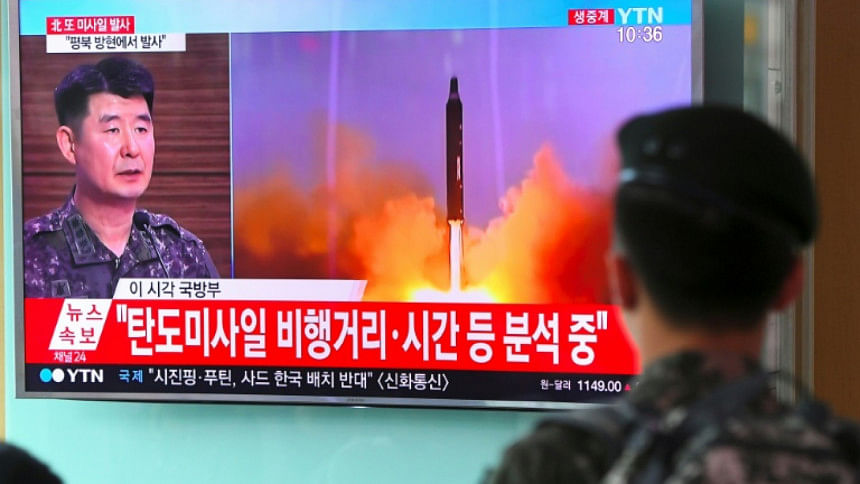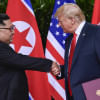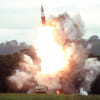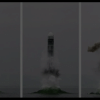NKorea fires ballistic missile, again

North Korea launched a ballistic missile Tuesday as the US prepared to mark its Independence Day, triggering a Twitter outburst from President Donald Trump who urged China to "end this nonsense once and for all".
The launch was the latest in a series of provocations that have ratcheted up tensions over the nuclear-armed North's weapons ambitions, and came days after Seoul's new leader Moon Jae-In and Trump focused on the Pyongyang threat in their first summit.
The "unidentified ballistic missile" was fired from a site in North Phyongan province, the South's Joint Chiefs of Staff said in a statement, and came down in the East Sea, the Korean name for the Sea of Japan.
It flew for "more than 930 kilometres", they added.
The device may have come down in Japan's exclusive economic zone, a spokeswoman for Tokyo's defence ministry told AFP -- waters extending 200 nautical miles from its coast.
Japanese Chief Cabinet Secretary Yoshihide Suga said the missile flew "for about 40 minutes" -- an unusually long flight time, with Prime Minister Shinzo Abe telling reporters: "This launch clearly shows that the threat has grown."
The US, Japan and South Korea will hold a summit on the sidelines of this week's G20 meeting on the issue, he added. "Also I will encourage President Xi Jinping and President Putin to take more constructive measures."
The United Nations has imposed multiple sets of sanctions on Pyongyang over its weapons programmes, which retorts that it needs nuclear arms to defend itself against the threat of invasion.

It has a goal of developing a missile capable of delivering a warhead to the US mainland -- something that Trump has vowed "won't happen".
There are doubts whether the North can miniaturise a nuclear weapon sufficiently to fit it onto a missile nose cone, or master the technology needed for it to survive re-entry into the Earth's atmosphere.
But analysts say the isolated, impoverished country has made great progress in its military capabilities in the years since young leader Kim Jong-Un inherited power.
In response to the latest launch, Trump asked on Twitter: "Does this guy have anything better to do with his life?"
US Pacific Command confirmed the test and said the land-based, intermediate range missile did not pose a threat to North America.
When Pyongyang launched a Hwasong-12 missile in May that reached an altitude of more than 2,000 kilometres, analysts said that implied a range of 4,500 kilometres if flown for maximum distance.
Independence Day
The North has carried out multiple launches since Moon -- who backs engagement with the North but also stresses the need for sanctions -- was elected in May, and he summoned the South's National Security Council in response to the latest firing.
Shea Cotton, a researcher at the James Martin Center for Nonproliferation Studies in the US, suggested the launch was deliberately timed to coincide with the anniversary of the US declaration of independence.
“It's already 4th of July in North Korea," he said on Twitter. "I somewhat suspect they're shooting off some fireworks today specifically because of that."
Washington, South Korea's security guarantor, has more than 28,000 troops in the country to defend it from its Communist neighbour, and fears of conflict reached a peak earlier this year as the Trump administration suggested military action was an option under consideration.
Trump had been pinning his hopes on China -- North Korea's main diplomatic ally -- to bring pressure to bear on Pyongyang.
Last week he declared that Beijing's efforts had failed, but returned to the idea on Twitter following the launch: "Perhaps China will put a heavy move on North Korea and end this nonsense once and for all!"
At the summit with Moon in Washington at the weekend, Trump declared that the US had run out of patience with "the reckless and brutal regime" in North Korea, saying: "The nuclear and ballistic missile programmes of that regime require a determined response."
He later discussed the issue in separate phone calls with Chinese leader Xi Jinping and Japan's Abe.
There was also deep anger in the United States after Otto Warmbier, an American student who was detained in North Korea on a tourist trip around 18 months ago, was returned home in a coma in June, dying days later.

 For all latest news, follow The Daily Star's Google News channel.
For all latest news, follow The Daily Star's Google News channel. 








Comments